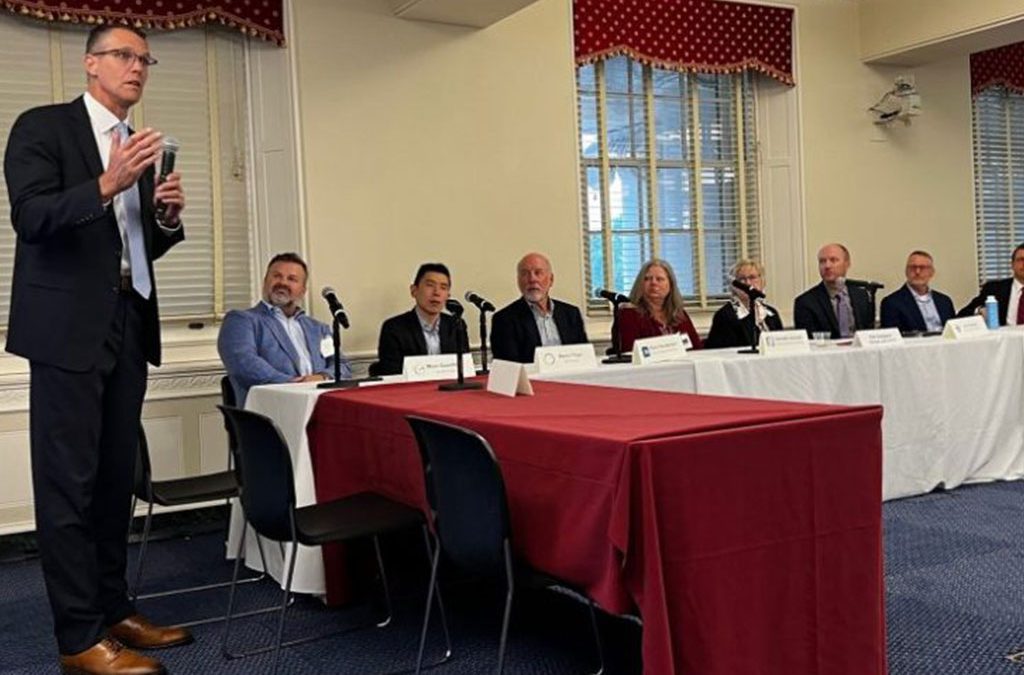Turn your voice into action
The Congressional Family Business Caucus held its second meeting of the year on May 14 in the Longworth House Office Building. The Bi-Partisan Caucus includes 45 House members and was created to raise awareness and educate how family businesses impact the US economy, job creation, and their communities. Each Caucus meeting has a specific focus of importance to family businesses. This meeting addressed the impacts of tax policies created on succession issues facing America’s family businesses.
The Caucus was the highlight of an all-day event for the family business members, Family Business Center Executive Directors, and other family business leaders who traveled to Washington, DC to voice their support for family businesses. The meeting was organized through the tireless efforts of Family Enterprise USA which promotes generationally owned family business creation, growth, viability, and sustainability by advocating for family businesses and their lifetime of savings with Congress in Washington DC. The purpose of meeting with Congressional offices was to convince members of Congress to join the bi-partisan, educational caucus.
Patton Boggs Squire, an international law firm, began the day with a presentation regarding the 2024 election. They identified the retirement of Sen. Joe Manchin, as a key pickup opportunity for Senate Republicans and that redistricting litigation has provided Democrats with key pick-up opportunities in the House in Alabama and Louisiana. Hearing the perspective of both sides of the aisle highlighted the contention, but also showed the cordialness of Washington that the media doesn’t capture.
This second session focused on the tax implications for family businesses as the provisions of the Tax Cuts and Jobs Act (TCJA) are set to expire in 2025. This presentation helped provide a clear-eyed view of various possibilities based on the results of the election. It also reinforced the importance of updating estate plans under the current rules before things change after 12/31/2025. And they WILL change. It’s not sure how it will change and that won’t become clear until well into 2025.
The TCJA includes tax cuts include individuals and businesses.
For family businesses, the most significant provisions include the estate-tax exemption reverts and the 20% section 199A deduction expires.
If nothing new passes, the estate tax lifetime exemption will drop from $13 million per individual/$26 million for couples, to $7 million per individual and $14 million for couples. This creates tremendous issues for capital-intensive family businesses that may be forces to sell their business in order to pay the estate tax.
The other important provision is Section 199A, which allows individuals, estates, and trusts with pass-through business income to deduct up to 20% of their QBI in calculating their income tax liability, subject to certain limitations. The maximum Section 199A deduction cannot exceed 20% of a pass-through business owner’s taxable income, less capital gains and dividends. Since 80% of family businesses are pass through entities, it is of enormous concern to family business owners.
According to the Congressional Research Service, the proponents of the Section 199A deduction say that it should be extended mainly because it encourages eligible firms to grow faster. The deduction lowers the tax burden on business investment, allowing passthrough firms to invest more and hire more workers than they otherwise would. According to proponents, another reason to retain the deduction is that it narrows the difference between the tax burden on corporate profits and the tax burden on pass-through business profits.
After the presentations, attendees prepared for their meetings with their local Congressional Offices. Attendees were given guidelines to help convince members of Congress of the advantages of joining the Family Business Caucus which include:
- A platform to engage on economic and family business issues.
- A district network of business leaders committed to your communities.
- A platform to advance your agenda; and
- A forum for bipartisan credibility and opportunities.
- During the meetings on Capitol Hill, the attendees reminded the staff that family businesses were the economic engines in their districts and also were the leaders in supporting local impact and philanthropy. This message was the same regardless of whether the representative was a Republican or Democrat.
The Caucus took place at the end of the day and congressional members from both parties attended Including co-chair Brad Schneider (D-IL), Rep. Randy Feenstra (R-IA), and Rep. Lloyd Smucker (R-PA). The Caucus featured a panel of family business owners discussing succession issues within their own family business.
- Marc Goodhart (President of Goodhart Sons, Inc.) discussed his fourth-generation custom manufacturing business. Marc highlighted that the average tenure of his employees is approximately 16 years and noted that his business employs several non-owner parents and children as employees.
- Dave Henderson (Former President and CEO of Cilker Henderson Properties) noted the importance of family business owners developing a plan to transition their business to the next generation of ownership, including communicating succession plans to children. He shared his personal experience of transitioning management of his family business to his son and also highlighted the negative impact of uncertainty in government policies on succession and taxes and their impacts on family-owned businesses.
- Danielle Koehler (Chairwoman of The Vollrath Company) provided an overview of her family’s sixth generation stainless steel and aluminum manufacturing business which employs over 1,300 employees worldwide. Danielle discussed her family’s experience with succession, including her grandfather’s decision to place his shares in the family business into a generation-skipping trust (GST) and noted challenges in planning for future estate tax liabilities.
- Mark Nicholson (Former Co-Owner of Red Jacket Orchards) then discussed his third-generation agriculture and beverage company. Mark stressed the importance of planning for unexpected situations and relying on expert resources for succession planning.
- Steve Wells (Co-Founder of American Food & Vending) who highlighted his family’s experience in planning for the succession of their food and dining services company. He stressed the importance of perpetuating family-owned businesses but noted that many family-owned businesses fail to continue between generations, including due to a lack of education and barriers to succession, such as the estate tax.
- Kevin Tsao (Chief Strategy Officer of ENO Brands) discussed his decision to enter the family business. One of Kevin’s considerations was the willingness of the family to positively impact their local community. It was noted that while giving back to the community is part of a family business’s DNA, it’s also important to share their impact with the community. While family businesses don’t seek publicity, it serves as a reminder to other family businesses and the general community, that family businesses are the lifeblood of the community.
Next, Jon Kemig (Executive Director of the University of St. Thomas Family Business Center) provided remarks on behalf of the family business centers in attendance. Jon discussed the role of family business centers in providing family business education, including on ownership rights and succession planning. He also highlighted recent events held for Women- and Black-owned businesses, which included discussions on access to capital and other issues facing family-owned businesses.
Dann Van Der Vliet, Executive Director of Cornell University’s Smith Family Business Initiative, presented new research, “2024 Family Business Next Gen Survey.” The research findings are focused on the next generation of family business owners enrolled in family business or entrepreneurship-related courses during the 2023-2024 academic year.
Highlights from the findings showed that 62% of respondents are currently involved or employed by their family business and 70% will work for the family business upon completing their education. In addition, Van Der Vliet said the research showed 42% have ownership in the business and 62% were the second generation of ownership.
To summarize the day, it was pretty terrific. It was an honor to be given the experience to see DC firsthand and gain a better appreciation for how bills become law. Many thanks to FEUSA for organizing the meetings with Congressional offices and their staunch support of family businesses.
If you want to support your family business and get your voice heard in Washington, contact John Gugliada at Family Enterprise USA. One final note, when traveling to DC, bring comfortable walking shoes. With 535 congressional and senate offices spread throughout six buildings, there’s a lot of territory to cover.
We hope you’ve enjoyed this article. While you’re here, we have a small favor to ask…
As we prepare for what promises to be a pivotal year for America, we’re asking you to consider becoming a supporter.
The need for fact-based reporting of issues important to family offices and successful families and protecting a lifetime of savings has never been greater. Now more than ever, family offices and successful families are under fire. That’s why Policy and Taxation Group is passionately working to increase the awareness of issues important to family offices and successful families, while continuing to strengthen our presence on Capitol Hill.
Policy and Taxation Group is the Voice for Family Offices and Successful Individuals in Washington, DC focused exclusively on the critical tax and economic policies that impact them.
Since 1995, Policy and Taxation Group has been the leading advocacy group working to reduce and eliminate estate tax, gift tax, and generation skipping transfer tax while blocking increased income tax and capital gains taxes, the creation of a wealth tax, and other hostile tax policies that punish hardworking taxpayers and success.
#incometax #CapitalGainsTax #R&DExpensing #DontPunishSuccess #GrantorTrusts #StepUpinBasis #likeKindExchanges #AcceleratedDepreciation #EstateTax #Deathtax #wealthtax #taxLegislation #incometaxrates #repealestatetax #FamilyOffice #SuccessfulFamilies @PolicyAndTaxationGroup @DitchTheEstateTax #PolicyAndTaxationGroup #DitchTheEstateTax



